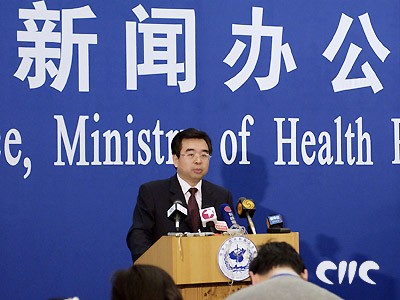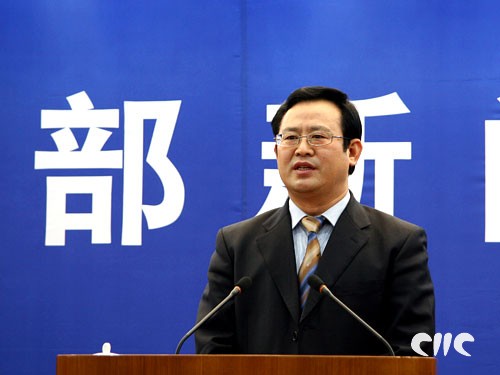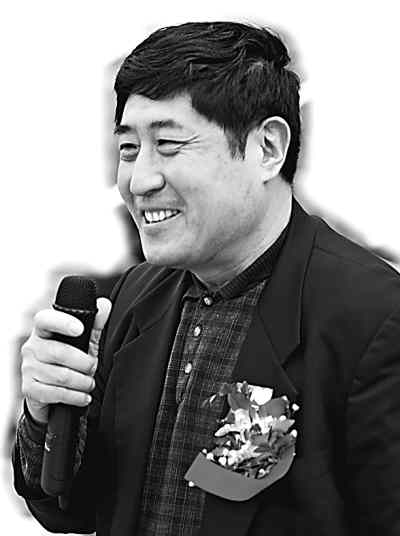The Internet has become a new channel between the masses and
government officials, transmitting public opinions and governmental
policies between the two. Meanwhile, the myriad ways information
can now be circulated to the public on the Internet also means that
information may deviate from the original text. This has generated
new challenges for governmental departments.
Spokesmen serving governmental departments act as crucial links
between the policy and the public.
How do they evaluate Internet opinions and resolve a crisis of
opinions? What are they required to do to qualify as information
officers in these Internet times?
The People's Daily in January invited five spokesmen to
talk about their experiences and impressions when dealing with
online opinions.
'New media impose challenges to government': Mao Qun'an,
Ministry of Health (MOH)
I start my daily work routine in the morning by surfing the
Internet for news and discussions among netizens, especially those
concerned with public health. In preparation for each press
conference, my specially assigned staff collects hot topics and
representative opinions from the Internet. Internet opinions
reflect the viewpoints and attitudes of a segment of the general
public that spokesmen like me should always follow and trace and
respond to immediately. This information is a new kind of challenge
brought to government representatives by the new media, with
Internet being the representative.
 |
Internet opinions can carry great weight regarding public
opinions about various issues, they can have positive effects
toward solving certain problems. However, Internet opinions also
have negative effects. At a regular press conference held by the
MOH in 2006, a reporter asked for the MOH's opinion on a piece of
news spread on the Internet which said that 100,000 people had
participated a signature drive that called for abandoning
traditional Chinese medicine. The question surprised me: I was
unaware of this information. I refuted the course of action by
citing related policies on the spot. Later I found out that only
some 100 people had given their signatures, not 100,000. This event
showed that information published on the Internet is not always
precise and sometimes it can easily mislead the general public.
A lot of netizens have made biased, subjective opinions, or even
caustic remarks, on the basis of imprecise and incomplete
information. Under the circumstances I felt anxious but it was
beyond my capacity to respond to every piece of opinion.
Being a spokesman, I am quite willing to communicate with
netizens. Some people have suggested that I open a blog, but I have
misgiving about this suggestion because netizens may merge my
personal opinions with the official governmental stance so I would
like to use other means of communication.
'It's better to actively confront Internet opinions than
to block them': Wang Xuming, Ministry of Education
(MOE)
The MOE has already held over 100 press conferences in recent
years and several portal websites conducted live broadcasts of each
conference. Also, notices about press conferences to be held in the
near future can be found on the MOE website.
Granting more financial aid to poverty-stricken students was one
of the primary tasks for the MOE in 2007, this was exactly in line
with the state policy to strengthen aid to poor students. In
addition, netizens also expressed a sustained interest for poor
students to receive a proper education. When state policies and
netizens' wishes act in unison, considerably powerful endeavors can
be enacted to confront difficulties.
However, as the most active and incisive part in public
attitudes, Internet opinions may hold erroneous values, especially
when news reports or commentaries published on some websites,
especially a few commercial websites, often quote remarks out of
context, use exaggerated headlines or stretch facts in order to
draw readers' attention. Quoting without introducing context or
background information can cause public opinion to go astray.
I think that websites should take a leading role in fostering a
sound environment for Internet opinions. Functioning as a
communicator of information and culture, websites should be aware
of the responsibilities they are bearing all the time; contents on
web pages should be easy to read, but not vulgar; websites should
have a screening system to make sure that all the information
appears on websites rapidly and accurately.
Administrative departments, on the other hand, should actively
confront Internet opinions rather than block them; they should,
after analyzing and examining Internet opinions, give quick and
definitive responses, thus remaining accountable to netizens.
As to netizens, I hope they could be more rational and
civilized; I wish I could see more meaningful discussions and less
abusive, insulting and malicious language on the Internet.
Education could enrich Internet information while the Internet
should promote more attention, understanding and support towards
education.
'Netizens' reasonable demands can't be disregarded':
Wang Yongping, Ministry of Railway (MOR)
Surfing the Internet daily to look through netizens' opinions
and suggestions is essential work for me. A file compiled from
railway-concerned Internet opinions is distributed to high-level
officials and related colleagues every day. They use the
information when they make decisions and enact initiatives to
accomplish certain improvements. This has become an important
channel for them to learn what the general public is thinking.
 |
Internet opinions are actually a form of emotional expression
made by people from all walks of life. Although irrational content
does exist, it can be said that Chinese netizens are becoming more
and more mature. They hold a sense of responsibility when
disseminating Internet information. Government officials are often
inspired and influenced by such opinions. For instance, the
decision not to raise the price of train tickets during the Spring
Festival holiday period was made by leaders in the MOR after
listening to voices and suggestions from a variety of sources,
including Internet. A government having accountability can't
disregard reasonable demands from netizens.
I have been struck deeply by netizens' support and nice
treatment. I once went to a website to have an interview with
netizens. I was late that day because of traffic jams and netizens
began to post texts bluntly criticizing me. After I arrived, I
began the interview with an earnest apology and talked about my
anxious feelings while I was sitting in a traffic jam. I said that
this feeling helped me better understand what train delays meant to
passengers and how crucial our obligations are. Netizens replied,
forgiving me at once and added many encouraging words concerning my
work commitment. This event has left a lingering impression on me
and I felt I could do nothing but speak honestly, demonstrate my
true sentiments and explore truth in order to repay the kindness
and generosity emanating from the general public.
Internet opinion is abundant and covers a wide variety of
categories. As a spokesman, I might, on the basis of reading these
opinions to the best of my abilities, grasp beneficial statements,
accept constructive recommendations, clear up misunderstanding and
boycott harmful and unhealthy information. Of course it is not easy
to do all the above, but I will do my best.?
'Releasing the truth can win credibility': Liu Dazhu,
National Audit Office (NAO)
When dealing with Internet opinions I think that an objective,
calm and reasonable attitude is required. Compared with
conventional media, the Internet has more readers and a wider
sphere of influence, allowing it to create more hot topics and
influential public opinion sometimes. If there were no proper
guidance, negative effects could easily be accomplished. Therefore,
it is a priority for all the spokespeople to reflect upon ways to
effectively avoid negative effects and give instead a more active
role to Internet opinions.
 |
In July 2006, a piece of news was published on the Internet,
saying that an auditing official in Cangzhou (Hebei Province) had
suddenly died at the gate of a hotel just after receiving a
reception. The news created an explosion of opinions published by
netizens on the Internet. The National Audit Office quickly made a
public statement through a spokesman. Meanwhile, an investigative
team was set up that followed official procedures; results were
announced to the public. Most netizens were satisfied with the
NAO's reaction.
Through this event we understood that governmental departments
should give active responses to Internet opinions and be
accountable to the public for discovering the truth. Only by
behaving in this way can they win credibility and support from
netizens.
Compared to other governmental departments, the NAO holds press
conferences less frequently. But the primary contents of each NAO
press release revolve around hot issues generated by netizens.
Before holding each press conference, we always have a meeting
with various press organizations in order to introduce related
information to the media as well as seeking out the concerns of the
media and public in regard to audits. By doing this we can offer
better information to meet everyone's needs.
We will, as always, actively deal with Internet opinions and
release more accurate auditing information to the public in a
timely fashion.
'Play the positive role of Internet opinion': Zhang
Jianzhong, National Tourism Administration (NTA)
Nowadays, Internet opinion plays an important role regarding
public opinion, acting as a key channel for the public to know and
oversee governmental works. Therefore, as a governmental official,
especially as a spokesman, I always keep a close watch on netizens'
opinions and suggestions. I use this information to help prepare
for each press conference.
I have found in my work that netizens are paying more and more
attention to public affairs and they have played positive roles in
solving certain issues. Nevertheless, because of the rapid and wide
circulation of the Internet, some Internet opinions might not be
rational or true. Sometimes netizens hold forth erroneous opinions
before the truth is uncovered and published to the public. So, how
to strengthen the validity of Internet opinions has become a vital
issue.
Spokesmen must keep abreast with red-hot social issues and
netizens' views, and at the same time calmly carry out
investigations and release authoritative results in a timely
fashion. Only by acting in this way can we better utilize the
positive role of Internet opinion.
China, boasting abundant tourism resources, will embrace more
tourists from around the world in 2008. I hope that the netizens
will continue to pay attention, as they already are doing, to the
development of tourism in the country. I will do my best to make a
bridge between the National Tourism Administration and the public,
thus guaranteeing smooth access of information between the two.
(China.org.cn January 24, 2008)